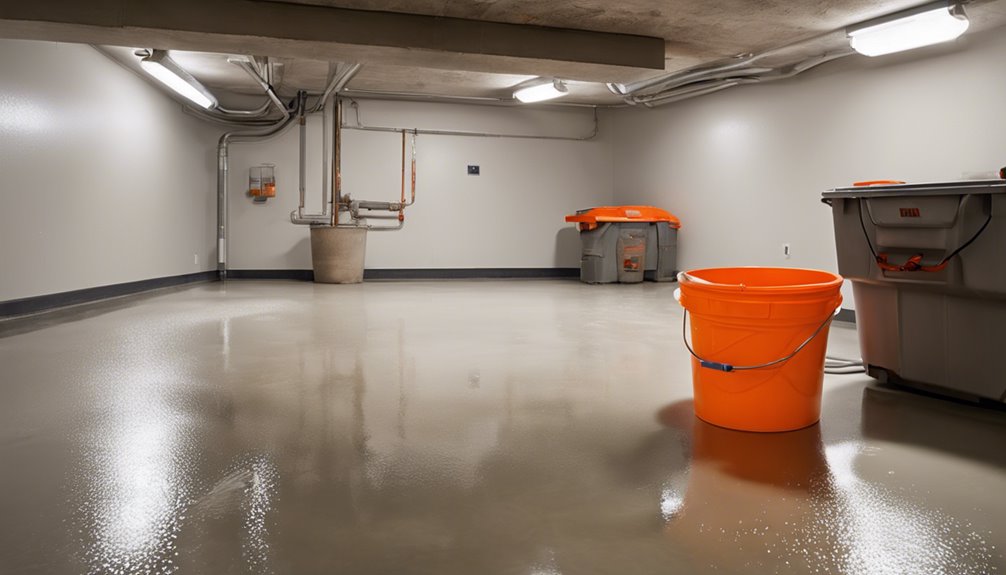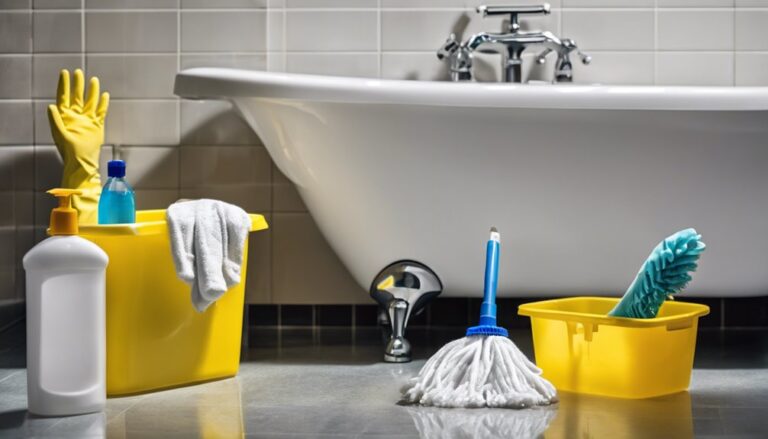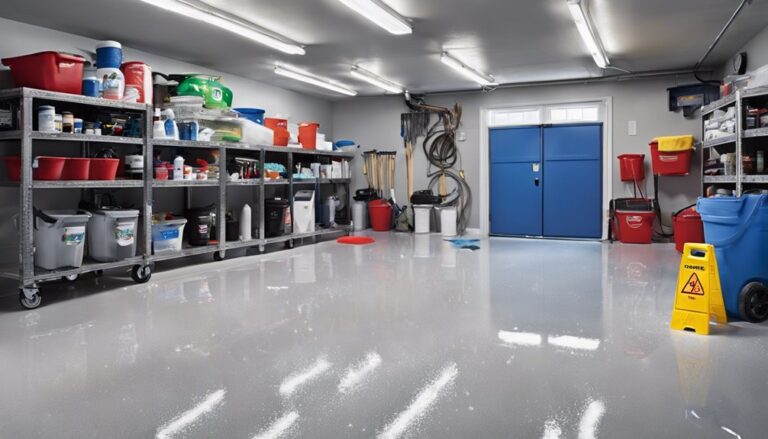To clean your basement's concrete floor, first, check for cracks, moisture, or stains. Gather supplies like a broom, vacuum, stiff-bristle brush, and a cleaning solution—dish soap mixed with water works well for grime, while vinegar helps with stains. Sweep or vacuum the floor to remove debris, then scrub the surface with your cleaning solution, focusing on tough spots. Rinse thoroughly with clean water to remove residue and use a fan or dehumidifier to speed up drying. Finally, consider applying a concrete sealer for protection. If you're looking for more tips and detailed methods, there's plenty more to discover.
Assess the Condition of the Floor
Before diving into the cleaning process, you should assess the condition of your concrete floor to determine the best approach. Start by inspecting for any signs of floor damage, like cracks or chips, as these can affect your cleaning strategy. Next, look for moisture issues, such as damp spots or efflorescence, which might indicate water infiltration. Addressing moisture is essential, since it can lead to mold growth and further deterioration of your floor. Take note of any stains or discoloration, too, as these will require specific cleaning methods. By thoroughly evaluating these factors, you'll be better equipped to choose the right cleaning techniques and products, ensuring your basement floor gets the care it needs for a fresh start.
Gather Necessary Cleaning Supplies
After evaluating the condition of your concrete floor, the next step is to gather the necessary cleaning supplies. Start with essential cleaning tools like a broom, dustpan, and a stiff-bristle brush to remove loose debris. Depending on the floor types, you might also need a mop or a pressure washer for deeper cleaning. Don't forget heavy-duty gloves and a bucket for mixing your solutions. If stains are present, stain removers or degreasers specifically designed for concrete can be valuable additions. Finally, consider a vacuum with a concrete floor attachment to guarantee you capture all dust and dirt. With these supplies on hand, you'll be ready to tackle your basement cleaning project effectively and efficiently.
Prepare the Cleaning Solution
To effectively clean your concrete floor, you'll need to prepare a suitable cleaning solution tailored to the specific stains or dirt present. Start by selecting your cleaning agents, which can include:
- Dish soap for general grime
- Vinegar for stains and odors
- Baking soda for tough spots
- Commercial concrete cleaner for heavy-duty needs
Make certain to take into account the solution ratios as you mix your agents. For example, a common ratio is one cup of vinegar to a gallon of water for a natural cleaner. If you're using a commercial product, follow the manufacturer's instructions for the best results. Mixing the right solution will guarantee you tackle the dirt and stains effectively, setting you up for a thorough clean ahead.
Clean the Floor Thoroughly
Once you've prepared your cleaning solution, it's time to get down to business and clean the floor thoroughly. Start by sweeping or vacuuming the area to remove loose dirt and debris. Next, apply your cleaning solution using a mop or scrub brush, focusing on any stains or high-traffic areas. For stubborn stains, consider using specific cleaning techniques like scrubbing with a stiff-bristled brush or using a pressure washer if necessary. Rinse the floor with clean water to remove any residue, ensuring that you don't leave any cleaning solution behind. Regular floor maintenance will help keep your concrete looking fresh and prevent grime buildup. This method not only enhances the appearance but also extends the life of your basement floor.
Dry and Maintain the Surface
While it may be tempting to skip the drying process, properly drying your concrete floor is essential to prevent mold and mildew growth. Invest time in effective drying techniques to guarantee a clean and safe environment. Here are some practical steps to dry and maintain your surface:
- Use a fan to circulate air and speed up drying.
- Open windows or doors to enhance ventilation.
- Consider a dehumidifier to reduce moisture levels.
- Apply a concrete sealer for lasting surface protection.
Frequently Asked Questions
Can I Use a Pressure Washer on My Basement Concrete Floor?
Using a pressure washer on your basement concrete floor can be effective, but you've got to be careful. The pressure washer benefits include removing tough stains and grime quickly. Just make sure you're not using too high a pressure, as it could damage the surface. For best results, follow basement cleaning tips like sealing nearby windows to prevent moisture and using appropriate cleaning solutions. Always wear protective gear to keep yourself safe during the process.
How Often Should I Clean My Basement Concrete Floor?
Ever thought about how a little regular upkeep can save you big headaches later? When it comes to cleaning frequency for your basement concrete floor, aim for at least once a month. This helps prevent dirt buildup and stains. During seasonal changes, consider a deeper clean. For maintenance tips, sweep regularly and spot-clean spills immediately. You'll not only keep your space looking fresh but also extend the life of your flooring!
Are There Eco-Friendly Cleaning Solutions for Concrete Floors?
Absolutely, there are plenty of eco-friendly cleaning solutions for your concrete floors. You can create a natural cleaning mix using eco-friendly ingredients like vinegar, baking soda, and essential oils. Just combine equal parts vinegar and water for a simple cleaner. For tougher stains, sprinkle baking soda on the area, spray with the vinegar solution, and let it fizz before scrubbing. This way, you can keep your space clean and fresh without harmful chemicals!
What Should I Do About Mold on My Concrete Floor?
Did you know that about 50% of homes have mold, which can lead to health issues? To tackle mold on your concrete floor, start by identifying moisture sources for effective mold prevention. Use a mixture of vinegar and water or a commercial mold cleaner for cleaning methods. Scrub the affected areas thoroughly, then guarantee proper ventilation to prevent future growth. Regular inspections and a dehumidifier can help keep your space mold-free.
Is Sealing My Concrete Floor Necessary After Cleaning?
Sealing your concrete floor after cleaning isn't just optional; it offers significant sealing benefits. It protects against stains, moisture, and wear, extending your floor's lifespan. You've got various sealing methods to choose from, like epoxy or acrylic sealers, depending on your needs. By sealing, you're not only enhancing the floor's appearance but also making maintenance easier. So, if you want durability and freedom from constant upkeep, sealing is a smart choice.




